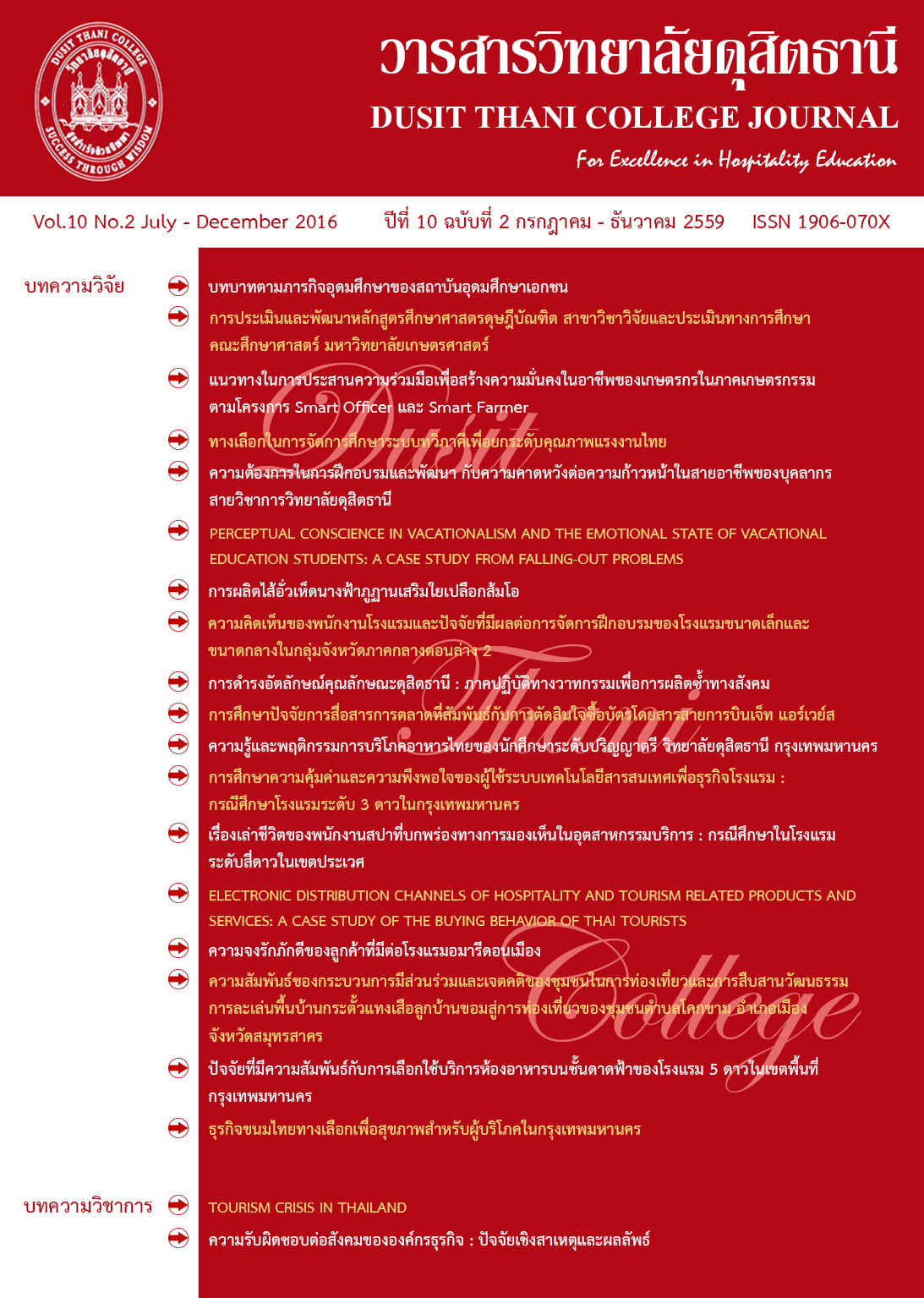การประเมินและพัฒนาหลักสูตรศึกษาศาสตรดุษฎีบัณฑิต สาขาวิชาวิจัยและประเมินทางการศึกษา คณะศึกษาศาสตร์ มหาวิทยาลัยเกษตรศาสตร์
Main Article Content
บทคัดย่อ
งานวิจัยนี้มีวัตถุประสงค์เพื่อประเมินหลักสูตรดุษฎีบัณฑิต สาขาการวิจัยและประเมินทางการศึกษา คณะศึกษาศาสตร์ มหาวิทยาลัยเกษตรศาสตร์ หลักสูตรปรับปรุง พ.ศ. 2554 และพัฒนาหลักสูตรปรับปรุงพ.ศ. 2559 โดยใช้วิธีการวิจัยเชิงประเมิน ตามองค์ประกอบของหลักสูตรในด้านบริบท ปัจจัย กระบวนการและผลผลิตรวบรวมข้อมูลจากแบบสอบถามผู้บริหารและบุคลากรทางการศึกษาที่เกี่ยวข้องจำนวน 125 คน นิสิตปัจจุบัน 4 คน บัณฑิต 5 คนและการสัมมนาวิพากษ์หลักสูตรจากผู้ทรงคุณวุฒิ 3 คน วิเคราะห์ข้อมูลใช้การวิเคราะห์ค่าร้อยละ ค่าเฉลี่ย ส่วนเบี่ยงเบนมาตรฐาน และการวิเคราะห์เนื้อหา พิจารณาประเมินด้วยเกณฑ์ที่มีค่าเฉลี่ย 3.51 ขึ้นไป และผู้ให้ข้อมูลเห็นถึงความเหมาะสมของสิ่งที่ประเมินผลการวิจัย พบว่า 1) หลักสูตรฯ มีความเหมาะสมที่จะดำเนินการต่อไปเนื่องจากร้อยละ 94.4 ของผู้บริหารและบุคลากรทางการศึกษาที่เกี่ยวข้องเห็นว่าเป็นหลักสูตรที่จำเป็นและมีความต้องการให้บุคลากรในหน่วยงานได้รับการพัฒนาหลักสูตรมีปัจจัยที่เหมาะสม ทั้งโครงสร้างหลักสูตรและรายวิชา การรับนิสิต แผนการจัดการเรียนและอาจารย์ที่สอนกระบวนการใช้หลักสูตร ต้องจัดหาแนวทางที่จะช่วยส่งเสริมให้นิสิตจบการศึกษาได้ตามแผนการเรียนบัณฑิตได้รับการพัฒนาสมรรถนะทางด้านการประเมินและสามารถนำไปใช้ในการประกอบอาชีพอาจารย์และนักวิจัยและประเมินทางการศึกษา สามารถผลิตผลงานทางวิชาการที่เผยแพร่ได้ 2) หลักสูตรปรับปรุง พ.ศ. 2559 ซึ่งผ่านกระบวนการวิพากษ์ของผู้ทรงคุณวุฒิและพัฒนาขึ้นมีความเหมาะสมทั้งด้านบริบท ปัจจัย กระบวนการและผลผลิตที่สมควรจะทำวิจัยเพื่อติดตามผลการใช้หลักสูตรนี้ต่อเนื่องไป
Article Details
นโยบายการพิจารณากลั่นกรองบทความ
- บทความวิจัยและบทความวิชาการทุกเรื่องที่จะได้รับการตีพิมพ์ต้องผ่านการพิจารณากลั่นกรองโดยผู้ทรงคุณวุฒิ (Peer Review) ในสาขาที่เกี่ยวข้อง จำนวน 3 ท่าน/บทความ
- บทความ ข้อความ ภาพประกอบและตารางประกอบที่ลงตีพิมพ์ในวารสารเป็นความคิดเห็นส่วนตัวของผู้เขียน กองบรรณาธิการไม่จำเป็นต้องเห็นด้วยเสมอไป และไม่มีส่วนรับผิดชอบใด ๆ ถือเป็นความรับผิดชอบของผู้เขียนแต่เพียงผู้เดียว
- บทความที่จะได้รับการตีพิมพ์จะต้องไม่เคยตีพิมพ์ เผยแพร่ที่ใดมาก่อน และไม่อยู่ระหว่างการพิจารณาของวารสารฉบับอื่น หากตรวจสอบพบว่ามีการตีพิมพ์ซ้ำซ้อน ถือเป็นความรับผิดชอบของผู้เขียนแต่เพียงผู้เดียว
- บทความใดที่ผู้อ่านเห็นว่าได้มีการลอกเลียนหรือแอบอ้างโดยปราศจากการอ้างอิง หรือทำให้เข้าใจผิดว่าเป็นผลงานของผู้เขียน กรุณาแจ้งให้กองบรรณาธิการวารสารทราบจะเป็นพระคุณยิ่ง
เอกสารอ้างอิง
ศรีนครินทรวิโรฒ. รายงานการวิจัย. ศูนย์วิทยาศาสตร์ศึกษา มหาวิทยาลัยศรีนครินทรวิโรฒ.
พรทิพย์ ไชยโส วสันต์ ทองไทย และแม้นมาศ ลีสัตยกุล. (2549). การประเมินหลักสูตรปรัชญาดุษฎีบัณฑิต สาขาวิทยาศาสตร์ศึกษา หลักสูตร 5 ปี รายงานการวิจัย. ภาควิชาการศึกษา คณะศึกษาศาสตร์ มหาวิทยาลัยเกษตรศาสตร์.
มาเรียม นิลพันธุ วิสาข จัติวัตร เสงี่ยม โตรัตน ฐาปนีย ธรรมเมธา และศิริวรรณ วณิชวัฒนวรชัย. (2554).
การประเมินหลักสูตรปรัชญาดุษฎีบัณฑิต สาขาวิชาหลักสูตรและการสอน รายงานการวิจัย.
คณะศึกษาศาสตร มหาวิทยาลัยศิลปากร.
มหาวิทยาลัยเกษตรศาสตร์. (2554). หลักสูตรศึกษาศาสตรดุษฎีบัณฑิต สาขาวิชาการวิจัยและประเมินทางการศึกษา (หลักสูตรปรับปรุง พ.ศ. 2554). ภาควิชาการศึกษา คณะศึกษาศาสตร์ มหาวิทยาลัยเกษตรศาสตร์.
ศิริชัย กาญจนวาสี. (2547). ทฤษฎีการประเมิน. กรุงเทพฯ: สำนักพิมพ์แห่งจุฬาลงกรณ์มหาวิทยาลัย.
ศักดิ์ศรี ปาณะกุล. (2554). “แนวคิดเกี่ยวกับการประเมินหลักสูตร” เอกสารการสอนชุดวิชาการประเมินหลักสูตร. นนทบุรี: มหาวิทยาลัยสุโขทัยธรรมาธิราช.
สุนีย์ ภู่พันธุ์. (2546). แนวคิดพื้นฐานการสร้างและการพัฒนาหลักสูตร. กรุงเทพฯ: ดวงกมลสมัย.
สุนันทา แก้วสุข. (2552). การประเมินหลักสูตรครุศาสตรมหาบัณฑิต สาขาวิชาการบริหารการศึกษา (หลักสูตรปรับปรุง พ.ศ. 2549).รายงานวิจัย. มหาวิทยาลัยราชภัฎธนบุรี.
สุวิมล ว่องวาณิช. (2548). การวิจัยการประเมินความต้องการจำเป็น. กรุงเทพฯ: สำนักพิมพ์แห่งจุฬาลงกรณ์มหาวิทยาลัย.
สมหวัง พิธิยานุวัฒน์. (2544). รวมบทความการประเมินโครงการ. (พิมพ์ครั้งที่ 3). กรุงเทพฯ:
จุฬาลงกรณ์มหาวิทยาลัย.
สำนักมาตรฐานและประเมินผลอุดมศึกษา สำนักงานคณะกรรมการการอุดมศึกษา กระทรวงศึกษาธิการ. (2553). มาตรฐานการอุดมศึกษาและเกณฑ์มาตรฐานที่เกี่ยวข้อง. กรุงเทพฯ: ห้างหุ้นส่วนจำกัดภาพพิมพ์.
สำนักงานคณะกรรมการอุดมศึกษา. (2550). กรอบแผนอุดมศึกษา ระยะยาว 15 ปี ฉบับที่ 2 (พ.ศ. 2551-2565). สำนักงานคณะกรรมการการอุดมศึกษา กระทรวงศึกษาธิการ.
สำนักงานคณะกรรมการการอุดมศึกษา. (2556). แผนพัฒนาการศึกษาระดับอุดมศึกษา ฉบับที่ 11
(พ.ศ. 2555-2559). กรุงเทพฯ: โรงพิมพ์จุฬาลงกรณ์มหาวิทยาลัย.
วิชัย วงษ์ใหญ่. (2546). กระบวนทัศน์การพัฒนาหลักสูตรใหม่. นนทบุรี: โรงพิมพ์มหาวิทยาลัย
สุโขทัยธรรมาธิราช.
วิชัย วงษ์ใหญ่. (2551). กระบวนการพัฒนาหลักสูตรและการเรียนการสอนภาคปฏิบัติ. พิมพ์ครั้งที่ 2. กรุงเทพฯ: สุวีริยาสาส์น.
Choate, Joyce S. (1992). Curriculum – based Assessment and Programming. 2nded. Needham Heights MA: Allyn and Bacon.
Hewitt. T. W. (2006). Understanding and Shaping Curriculum, What We Teach and Why. Thousand Oaks: SAGE Publications, Inc.
Madaus, G.F., Scriven,M., & Stufflebeam, D.L. (1983). Evaluation Models. Boston: Kluwer-Nijhoff Publishing.
Mertens, D.M. (2010). Research and Evaluation in Education and Psychology. Los Angeles: SAGE Publications, Inc.
Worthen.,B.R. Sanders, J.r. .& Fitzpatrick, J.L. (1997). Program Evaluation: Alternative Approach and Practical Guidelines. 2nded. New York: Longman.


